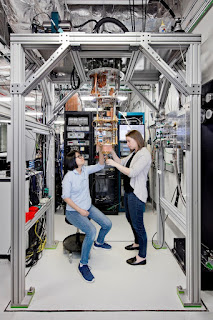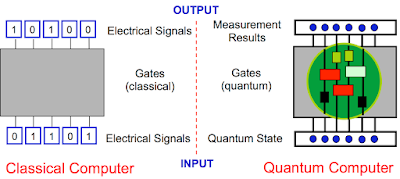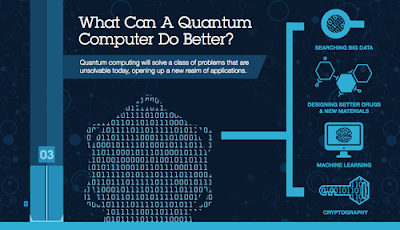Twitter Feed
Crisis Response Using Cloud Computing
Cloud computing is more than servers and storage. In a crisis situation it can actually be a lifesaver. BlackBerry, in fact, has just become the first cloud-based crisis…
Cloudy Thinking and Digital Transformation
(Originally posted on the Engility Corporation Blog) There’s a lot to gain from cloud computing, but success requires a thoughtful and enterprise focused approach. Cloud computing decouples data and…
Blockchain Business Innovation
Is there more than bitcoin to blockchain? Absolutely, because today’s blockchain is opening up a pathtowards the delivery of trusted online services. To understand this statement, you need…
How Quantum computing with DNA storage will affect your health
By Guest Contributor: Taran Volckhausen, Contributing Editor at Vector (https://www.indexer.me) Moore’s Law, which states that processing speeds will double every two years as we cram more and more silicon…
36 Shades of Hybrid IT
Photo credit: Shutterstock Everyone has heard of the 50 Shades of Grey. But do you know the “36 Shades of Hybrid IT”? These shades are a new way of describing…
Digital Transformation Driven by ITaaS
Photo credit: Shutterstock When executing an effective digital transformation strategy, management is tasked with placing the right workload into the most appropriate IT environment. This represents a shift from…
IBM Interconnect 2017: Cloud, Cognitive and Data!
A couple of weeks ago while attending IBM Interconnect 2017 I had the awesome opportunity to participate in the IBM Interconnect 2017 Podcast Series with Dez Blanchfield. I not only…
The BYOD Problem
Everyone wants their device of choice right there next to them 24/7. To an employer, however, that smart device is nothing more than a dagger posed to rip apart every…
Both Sides of Enterprise Mobility
Photo credit: Shutterstock Enterprise mobility has become table stakes in the world of business. The ability to access current information at any time, from anywhere, on any device has really…
Cloud Computing Forensics Readiness
Photo credit: Shuterstock In today’s globally connected world, data security breaches are bound to occur. This, in turn, increases the importance of digital forensic readiness, or the ability to access…
- The release of a new API (Application Program Interface) for the IBM Quantum Experience that enables developers and programmers to begin building interfaces between its existing five quantum bit (qubit) cloud-based quantum computer and classical computers, without needing a deep background in quantum physics.
- The release of an upgraded simulator on the IBM Quantum Experience that can model circuits with up to 20 qubits. In the first half of 2017, IBM plans to release a full SDK (Software Development Kit) on the IBM Quantum Experience for users to build simple quantum applications and software programs.
The IBM Quantum Experience enables anyone to connect to IBM’s quantum processor via the IBM Cloud, to run algorithms and experiments, work with the individual quantum bits, and explore tutorials and simulations around what might be possible with quantum computing. Since its launch less than a year ago, about 40,000 users have run over 275,000 experiments on the IBM Quantum Experience. It has become an enablement tool for scientists in over 100 countries and, to date, 15 third-party research papers have been posted to arXiv with five published in leading journals based on experiments run on the Quantum Experience.
 The broad availability of quantum computing capability could prove to be a significant blow to current data encryption practices. In 2015 the US National Security Agency actually advised US agencies and businesses to prepare for a time when the cryptography protecting virtually all e-mail, medical and financial records, and online transactions would be rendered obsolete by quantum computing. The US National Institute for Standards and Technology (NIST) is also running a competition to spur work on post-quantum algorithms.
The broad availability of quantum computing capability could prove to be a significant blow to current data encryption practices. In 2015 the US National Security Agency actually advised US agencies and businesses to prepare for a time when the cryptography protecting virtually all e-mail, medical and financial records, and online transactions would be rendered obsolete by quantum computing. The US National Institute for Standards and Technology (NIST) is also running a competition to spur work on post-quantum algorithms. - Drug and Materials Discovery: Untangling the complexity of molecular and chemical interactions leading to the discovery of new medicines and materials;
- Supply Chain & Logistics: Finding the optimal path across global systems of systems for ultra-efficient logistics and supply chains, such as optimizing fleet operations for deliveries during the holiday season;
- Financial Services: Finding new ways to model financial data and isolating key global risk factors to make better investments;
- Artificial Intelligence: Making facets of artificial intelligence such as machine learning much more powerful when data sets can be too big such as searching images or video; or
- Cloud Security: Making cloud computing more secure by using the laws of quantum physics to enhance private data safety.
This content is being syndicated through multiple channels. The opinions expressed are solely those of the author and do not represent the views of GovCloud Network, GovCloud Network Partners or any other corporation or organization.
( Thank you. If you enjoyed this article, get free updates by email or RSS – © Copyright Kevin L. Jackson 2017)
Cloud Computing
- CPUcoin Expands CPU/GPU Power Sharing with Cudo Ventures Enterprise Network Partnership
- CPUcoin Expands CPU/GPU Power Sharing with Cudo Ventures Enterprise Network Partnership
- Route1 Announces Q2 2019 Financial Results
- CPUcoin Expands CPU/GPU Power Sharing with Cudo Ventures Enterprise Network Partnership
- ChannelAdvisor to Present at the D.A. Davidson 18th Annual Technology Conference
Cybersecurity
- Route1 Announces Q2 2019 Financial Results
- FIRST US BANCSHARES, INC. DECLARES CASH DIVIDEND
- Business Continuity Management Planning Solution Market is Expected to Grow ~ US$ 1.6 Bn by the end of 2029 - PMR
- Atos delivers Quantum-Learning-as-a-Service to Xofia to enable artificial intelligence solutions
- New Ares IoT Botnet discovered on Android OS based Set-Top Boxes




